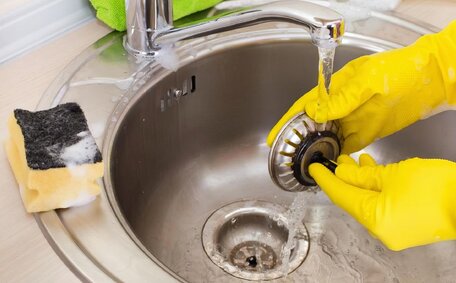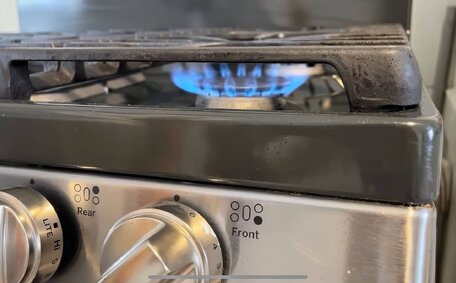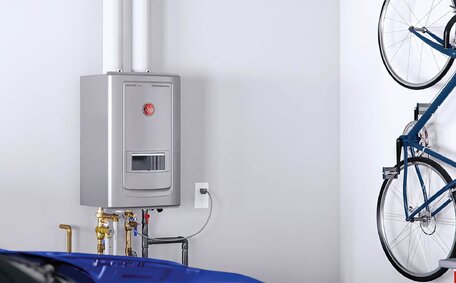What is Gas Pipe Relining?
Gas pipe relining refurbishes damaged pipes using a trenchless technique, eliminating the need for excavation. A resin-saturated liner is inserted into the existing pipe and upon curing, it forms a new, seamless pipe within the old one, renewing your plumbing system’s gas pipes from the inside.
There are two main applications of advanced pipe relining technology:
- CIPP (Cured-in-Place Pipe) uses a felt liner soaked in epoxy resin to strengthen pipes your plumbing system relies on.
- SIPP (Spray-in-Place Pipe) uses an epoxy resin that is sprayed onto the interior of the pipe.
Drain relining, vital for preserving plumbing system integrity, is applicable to all pipe materials such as steel, iron, and galvanised pipes. It substantially extends the life of your gas pipes and minimises disruption. The reliability of the pipeline is ensured, maintaining full functionality throughout the relining process.
Key benefits of gas pipe relining for repairing broken or damaged pipes include:
- There’s no need to dig up or damage driveways or landscaping
- Significantly less disruption to your daily routine than a full replacement
- Restores flow capacity and pressure and can repaired using modern techniques
- Seals leaks and prevents further corrosion
- Cost-effective with up to 50 years of additional pipe life anticipated
- Cost-effective compared to replacement
- Prevents tree roots from invading pipes
In summary, gas pipe relining enables the original pipe to be restored in-place without the mess and expense of digging them up. It’s an efficient, non-invasive solution that ensures you can get refurbished pipes without the hassle for the long haul.
When to Consider Relining vs Replacing Your Gas Pipes
In certain situations, relining gas pipes may prove more advantageous than a complete overhaul.
- Condition of Existing Pipes - If pipes are badly corroded or have extensive damage, full replacement may be required. But if deterioration is minimal, relining can restore them.
- Pipe Location - Relining is ideal for pipes in difficult to access areas, avoiding major excavation.
- Pipe material - Relining is often more effective for metal gas pipes than replacement is. Non-metal pipes typically require replacement.
- Cost - The expense for relining is typically 50-60% less than replacement.
- Disruption - Trenchless pipe repair like relining exerts minimal effect on your garden’s layout.
The relined pipe is significantly reinforced, with a durability expected to exceed 50 years. The epoxy resins firm up in the sewer pipe, raising the question of how long these new durable pipes will last, potentially decades.
Specialists often recommend relining for compromised metal gas pipes that retain structural integrity, as it offers a cost-effective method to extend their lifespan while avoiding disruptive excavations.
Book your consultation now to determine if relining is suitable for your severely damaged pipes. Get professional advice to unravel how relining can suit your specific plumbing needs.
How Gas Pipe Relining Works
Gas pipe relining involves a multi-step process performed by trained technicians:
- Camera inspection - A specialised drain camera is threaded through the plumbing pipe to assess its condition and pinpoint any problem areas. Measurements are taken.
- Cleaning - The pipe is thoroughly cleaned to remove debris and prepare the surface.
- Resin Insertion - A flexible lining tube or coating is inserted into the pipe. Liners are usually epoxy-soaked felt for CIPP relining. Epoxy resin is sprayed for SIPP relining.
- Curing - The relining work material is cured, either using hot water for CIPP or by ambient temperature for SIPP. This hardens the resin into a smooth, jointless new pipe.
- Reconnection - Once cured, the ends of the pipe are reconnected to gas supply lines and any service lines.
- Testing - Pressure tests check for leaks and confirm normal gas flow has resumed.
Trenchless pipe repair can rejuvenate materials such as steel, cast iron, and copper, reinforcing the pipes in your home. It restores gas flow and pressure, providing relief to homeowners without the significant disruption of excavating and replacing pipelines.
Some key advantages of gas pipe relining include:
- Only negligible surface interference because the process requires just minimal access pits to access your existing pipelines.
- Exponentially quicker than a replacement - Same day service often restores your gas supply promptly.
- No disruption to your gas flow - No damage to your supply chain during the relining operation.
- More than long-lasting - extends pipe life by multiple decades.
In summary, gas pipe relining Sydney offers as a highly effective in-place renewal method that can restore most types of gas pipes suffering from damage, corrosion and leaks.
Pros and Cons of Gas Pipe Relining
Comparing pipe relining to full pipe replacement highlights several advantages for maintaining your gas piping system:
- Cost savings - Relining costs approximately 50-60% less than replacing pipes.
- Minimal disruption - I am content to say there’s no need to dig trenches through landscaping or driveways.
- Speed - Pipe remains in service so gas supply unaffected.
- Longevity - Extends lifespan of pipes by 50+ years.
- Versatility - Applicable across multiple types, pipe materials such as steel and iron are effectively serviced.
Potential limitations include:
- Pipe condition - Severely damaged types of pipe may still need replacing.
- Materials - Cannot reline non-metal pipe materials like PVC.
- Able reline bends - Recent advances in relining techniques can now address even tight bends in pipes.
- Scope - The main sewer line and related gas lines may present some challenges.
- Preparation - To ensure customer satisfaction, any existing coatings and linings must be removed prior to relining.
In essence, through my practical knowledge, i know that gas pipe relining offers an eminent alternative to complete replacements. It restores pipe integrity at a fraction of the cost and disruption. Seek expert counsel to know how to best determine if your pipes are suitable for relining.
Signs You Need Gas Pipe Relining
There are several telltale signs that indicate your gas pipes may be in need of relining:
- Frequent leaks or gas odours - If you detect gas smells in or around your home, or The gas company has identified leaks, relining can permanently seal pipes, making them able reline effectively.
- Pipe corrosion and rust - Corrosion undermines the strength of pipes, leading to gas leaks; thus, corroded or rusty pipes can be ideal contenders for relining.
- Reduced gas flow - Slow pipes that affect appliances like your gas heater suggest internal corrosion that can be addressed with relining.
- Frequent bursts or cracks - Signs of broken pipes in decline, these indicate a higher risk of significant breaches. Relining provides a long-term solution.
- Old pipes - Pipes surpassing 40-50 years tend to approach their use’s finale, however, a pipe can relined to prolong their operation. Proactive relining extends their life significantly.
- Previous pipe patching - If sections have been patched and you considered was going to hold, relining provides a more comprehensive and permanent solution.
- Planning renovations - Relining avoids digging up pipes during renovations for a non-invasive solution.
Don’t ignore the warning signs of failing gas pipes. Relining offers a competent and practical substitute for overhauling your plumbing network. Consult a skilled plumber who can discuss how relining can detail the advantages of relined pipes and appropriateness of gas pipe relining for your specific circumstances.
Finding a Qualified Professional for Gas Pipe Relining
When considering sewer pipe relining, seek out an experienced, licensed plumber. Below are some tips for selecting a qualified plumber for gas pipe relining:
- Search for licenced plumbing and gas experts who are specifically trained and certified for gas pipe work.
- Choose a company well-versed in providing comprehensive pipe relining services, including techniques like CIPP and SIPP.
- Inquire and let the experts talk me through their established reputation and documented tally of completed relining jobs.
- Request a demonstration where a seasoned plumber can unveil examples of previously conducted relining, which effectively presented examples that showed me the excellence and efficiency of their work.
- Opt for a plumber from Pennant Hills Plumbing who delivers a relining solution aligned with the comprehensive services we provide.
- Ensure they have proper insurance coverage for added security and peace of mind.
- Get quotes from at least 2-3 plumbers to compare pricing.
- Inquire about any potential service or call out fee before committing.
- Read online reviews to gauge the quality work, service and expertise.
- Opt for a firm such as Pennant Hills Plumbing, a name i used and trusted in the local plumbing arena, confident you would use them again.
Taking the time to find the right plumbing services professionals for gas pipe relining ensures the job is completed properly, safely, and cost-effectively. Partnering with a singularly adept plumber, equipped with deep-rooted knowledge in pipe restoration, courtesy of the comprehensive services we provide.
Preparing for a Gas Pipe Relining Project
Getting your pipe system ready for relining requires some preparation to ensure the process goes smoothly:
- Have a video inspection done. A specialist will talk you through the camera-assisted assessment, gauging the condition of your pipes and their suitability for relining.
- Address any blockages and interferences, common in gas services, such as tree root invasions, corrosion accumulations, and intrusive connections demanding clearance before liner insertion.
- Schedule any required repairs, as professionals can repair drain leaks, cracked sections or canals which must be addressed prior to starting the relining.
- Arrange access for sewer stormwater. Small access pits will need to be dug at pipe endpoints so Technicians can reline your pipes with state-of-the-art equipment.
- Inform your gas utility. They will need to temporarily disconnect supply during the relining process.
- Protect your property. Take steps to take care your driveways, landscaping and other assets to safeguard your assets.
- Expect brief downtime. Your gas supply might be paused as part of the project, a minor inconvenience showcasing how they did great job our crew accomplished upon completion.
Meticulous preparation of your piping proves crucial, playing an integral role in the triumphant outcome of your gas pipe relining endeavour. The result offers significant benefits, with gas pipes rejuvenated from the core, sparing your property from substantial disruption.
Have a video inspection done.Clear any blocked drains and necessitate drain cleaning and obstructions.Schedule any required repairs.Arrange access.What to Expect Long-Term from Relined Gas Pipes
You can always count on relining your gas pipes as an investment that will provide long-lasting benefits for decades to come. Here’s what you can expect long-term from the relined gas pipes in your home:
- Extended Lifespan - Quality epoxy resins can restore old pipes for 50 years or more of continued use.
- Enhanced Safety - Relining seals leaks and fortifies pipes, mitigating risks associated with dangerous gas leaks that could harm your home.
- Improved Flow - Smooth internal walls boost gas flow, enhancing pressure for devices like your hot water system.
- Ongoing Savings - Avoid the significant expense of full pipe replacement while prolonging the life of your pipes.
- Minimal Maintenance - Pipes that have undergone pipe relining can display remarkable resistance to corrosion, alongside minimal maintenance needs.
- Reduced Disruptions - No more leaks, bursts or cracks requiring urgent pipe repairs.
- Peace of Mind - Rest easy knowing your gas pipes are like new for the long haul.
Gas pipe relining is a smart, forward-thinking solution. Rather than continuing reactive repairs on deteriorating pipes, relining restores them for the long term. Your relined gas pipes will provide safe, reliable service while avoiding costly and disruptive pipe failures down the road.
The process undertaken in your pipe relining venture ensures extended benefits and operational efficiency for the future.
Cost Comparison: Relining vs Replacing Gas Pipes
When it comes to gas pipe repairs, relining offers significant cost savings compared to full replacement. Here’s a comparison of typical costs:
- Pipe Replacement - $8,000 to $12,000 or more depending on pipe length and location
- Pipe Relining - $3,000 to $5,000 on average
There are several factors that make relining more economical than replacement:
- Minimal excavation - With there no need for large trenches, only small access pits are required, avoiding major digging costs.
- Faster process - Gas service is restored rapidly instead of waiting for new pipes.
- There’s no landscaping harm - Costly restoration of pathways, driveways and gardens is bypassed.
- Disposal fees - No costs for removal and disposal of old pipes.
- Labour - Relining takes less time and fewer staff than replacing pipes.
Although relining isn’t universally applicable, when suitable, it provides a premium alternative to traditional pipe substitution. Collaborate with our team of experts at Pennant Hills Plumbing, dedicated to delivering exceptional service, to ascertain if gas pipe relining is the most economical choice for your needs.
When it comes to gas pipe repairs, relining offers significant cost savings compared to full replacement.
\ - Pipe Replacement - $8,000 to $12,000 or more depending on pipe length and location
\ - Pipe Relining ct compliance with safety regulations and industry standards to prevent hazards like gas leaks or explosions. Here are some key safety measures professional plumbers will implement:
- Shutting off the gas supply and putting up warning signs to prevent accidental activation during the project.
- Conducting thorough leak detection inspections of the pipes before and after relining using specialised equipment.
- Following mandated pressurisation testing procedures to identify any weak points or leaks.
- Using only industry-approved curing methods for liners to ensure proper hardening.
- Having certified personnel on site who was very highly skilled in gas pipe handling.
- Coordinating closely with gas utility companies throughout the relining process.
- Meeting all requirements set out by gas installation standards and building codes.
- Providing home occupants with safety guidance such as avoiding ignition sources during the works.
Our very professional team will diligently take care of your safety, meticulously upholding all regulations during the gas pipe relining process. This guarantees that the pipe relining solutions are executed impeccably, offering you comfort knowing your gas pipes undergo relining with safety and legality.
Ensuring Safety and Compliance in Gas Pipe Relining
Gas pipe relining projects require strict compliance with safety regulations and industry standards to prevent hazards like gas leaks or explosions.
- Shutting off the gas supply and putting up warning signs to prevent accidental activation during the project.
- Conducting thorough safety inspections of the pipes before and af






